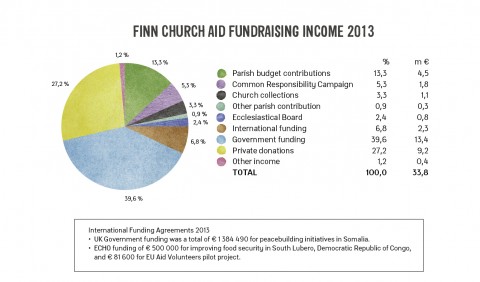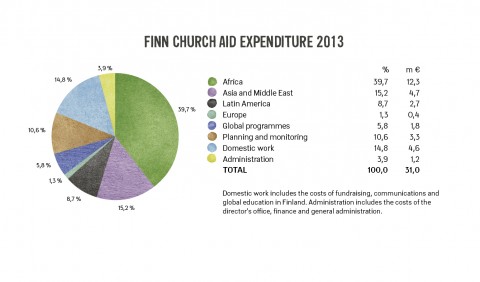Help for the weakest and poorest
Finn Church Aid (FCA) is one of the largest organisations of development cooperation in Finland. FCA’s income was over 30 million euros in 2013. Where did the millions come from and what was accomplished with them?
The church is highly visible in FCA’s operation. The organisation used to operate under the Finnish church earlier. The foundation of the FCA operates independently now. The main objective of the operations is to give long-term development cooperation aid to the very poorest.
”Aid is handed out to where it is most needed, in accordance with church social work principles” says Antti Pentikäinen, FCA Executive Director.
Funds for operations come from several sources. Over 50 per cent of the funding comes from Finland: the church, congregations and private people. The state share of the funding was approximately 40 per cent last year. FCA also receives funds from international financiers for example.
”When surveying proceeds and expenditures of the operation one must also consider the fact that funds that have been raised for a specific destination might not be used during the same year. For example the funds raised in 2013 for building schools will be used in 2014”, says Antti Pentikäinen.
Ideas fly in fundraising
FCA also actively raises funds itself. Ritka Heino, Director of Fundraising, reveals that there is no shortage of ideas when a new fundraising is being planned.
Realisation of a fundraising campaign is based on anticipation and calculation: expected proceeds and possible risks are considered. Campaigns are also tested through pilot projects.
Heino is grateful for media taking part in charity work. They offer free advertising space, discounts for notifications and volunteer work for help.
Exchanging knowledge and experience with other organisations gives clues as to what kind of fundraising is most functional.
”Every autumn we gather in an international fundraising seminar in Holland. There we have workshops, where we compare information and exchange experiences”, Heino says.
”I see fundraising as positive and innovative work” she says.
Help for the weakest
FCA has indicated three main objectives for its humanitarian aid. Work and aid is to be targeted to help forward peace, education and livelihood.
Aid work is carried out in several continents. All operations are guided by the same principle: the objective is to help those whose situation is the weakest – those suffering from war, hunger, poverty and violence.
All operation aims for long-term development cooperation. Projects are planned for three years at a time. Typical projects include for example teaching literacy and craftsmanship, supporting establishing small enterprises, education of rights, improving health care and prevent conflicts and famine. It is a priority to operate in such a way that those who have suffered will not become marginalized from their community or the society.
A specific share of the budget will be set aside for possible disasters every year.
”Through our strong network we are able to operate very quickly in events of disasters. Our aid work in the typhoon catastrophe in the Philippines is the most recent example of this” says Tomi Järvinen, FCA Director of International Cooperation.
Who gets help, will some get nothing?
FCA administration makes the aid decisions. ”We have a template for the decisions and we operate on it”, says Tomi Järvinen.
FCA catastrophe service is on call day and night every day of the year.
”We base our decisions on what kind of work and aid we focus on, since there usually are several big problems at the target site of the aid. After that we consider who will carry out the work.”
A network of skilled experts is needed for both choosing the sites for aid and for the field work. There are several experts of different areas of expertise in FCA network, such as experts in communication, teachers, theologians, peace mediators, interpreters, experts in building technology and experts in infrastructure and logistics.
FCA operates in countries where large international organisations may not necessarily operate in, according to its strategy. The ultimate idea is to defend the weakest of all, those who nobody else will help.
”And yet we cannot help quite everybody” says Järvinen. ”But I still find humanitarian work very interesting and rewarding.”
”Work is on my mind practically all the time, in free time as well” says Järvinen. Antti Pentikäinen admits the same.
”Work sets the values in my own life in different perspective. My own issues are not the greatest of problems.”
Development cooperation calls for expertise
How big is the share of the donations given to an aiding organisation that reaches the destination and how big the share that is used on administrative expenses – this question rises regularly.
”The share of administrative costs of the expenditures varies between 15 and 18 per cent in different years. One must note that the expenses of the local offices are included in these numbers”, says Antti Pentikäinen.
”Surely we could send thousand euros in an envelope to the people in developing countries, but is that the right way to do this work?”, says Tomi Järvinen.
”How could we do this important work without experts and a working organisation?”, says Ritka Heino.
Aid work carried out in a durable way is one of the basic principles of FCA, as emphasised by Pentikäinen.
Careful reporting of the use of the funds is a substantive part of the employers’ everyday work in FCA. The National Police Board monitors the operation, which has been granted a money collection permit. The financiers demand detailed reports on the use of the funds. Reporting is also needed in developing both quality and efficiency of operations.
Inspector revises accounts and expenses
FCA aims for transparency in its work and also openly makes its work known. Information about financing and use of funds in target countries can be found on FCA website.
There is also an internal inspector working in the organisation, who reviews accounts, operating models and regime of different units on regular basis. The inspector also travels to regional offices around the world to review these same topics.
FCA has strong networks with partner organisations around the world. FCA is a member of the world wide ACT Alliance organisation, which has over 140 churchly organisations as members around the world.
Need for aid in separate sites at for instance a time of a catastrophe is coordinated in ACT Alliance headquarters in Geneva. The aim is to spread aid as evenly and appropriately as possible: it is no use for all organisations to aid the same site in the same way.
What’s new in 2014?
At the moment FCA operates in Guatemala, Honduras, Haiti, Kosovo, Syria, Lebanon, the Palestinian territories, Jordan, Nepal, Myanmar, Cambodia, Sierra Leone, Liberia, Central African Republic, South Sudan, Somalia, Uganda, Democratic Republic of the Congo, Angola, Kenya, Zimbabwe and Mosambique. These are all nations where part of the population live in the most difficult conditions.
FCA has had as many as over 50 targets countries of operations. The number has been reduced in order to more efficiently focus the resources. The newest target nation is Myanmar, where survey of future aid projects is on-going at the moment.
Text: Sofia Flygare

